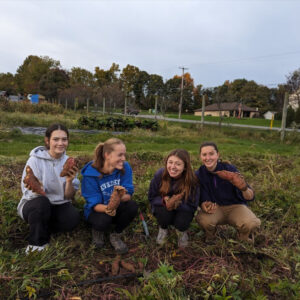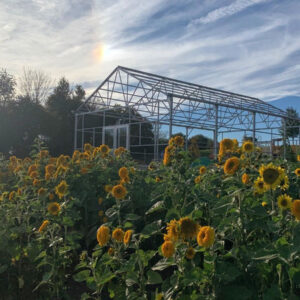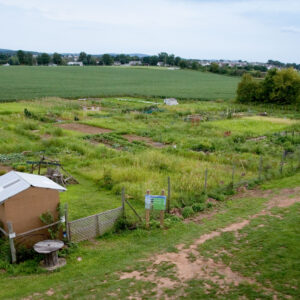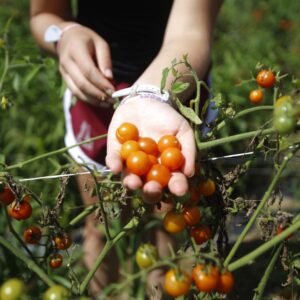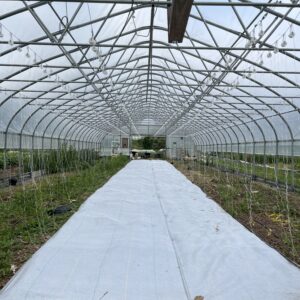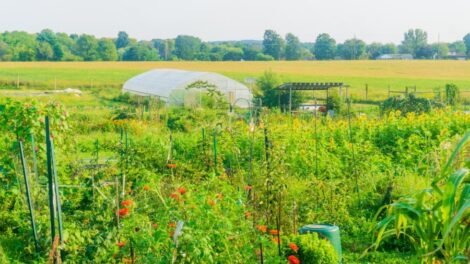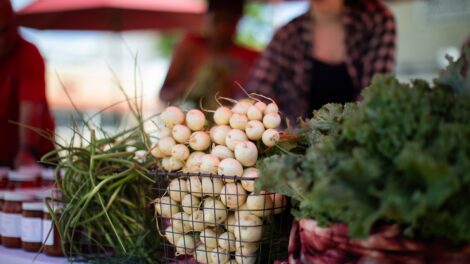Northeast Student Food and Farm Conference
The 2025 Conference has now concluded. Check back on this page for event materials and 2026 updates.
3rd Annual Northeast Student Food & Farm Conference
Saturday April 5th, 2025
Lafayette College, Easton, Pennsylvania
The mission of the conference is to bring together a group of active and passionate students to share ideas and resources around creating and maintaining student farms and initiatives to further sustainable agriculture, food justice, and other related matters.
This year’s focus topic will be on food justice
Conference Schedule
Friday, April 4th, 2025
- 4:30 – 6:30 p.m.: Arrival & Accommodations (optional)
- 6:30 – 7:30 p.m.: Welcome Reception (dinner provided)
Saturday, April 5th, 2025
- 8:00 – 9:00 a.m.: Check-In
- 9:00 – 9:30 a.m.: Conference Welcome with Lafayette College President Nicole Hurd
- 9:30 a.m. – 12:15 p.m.: Round Robin Presentations
- 12:15 – 2:30 p.m.: Provided-Lunch in Downtown Easton, PA and trip to Nurture Nature Center*
- 2:30 – 4:00 p.m.: LaFarm Tour or Campus Sustainability Tour*
- 4:00 – 4:45 p.m.: Farmer and Academia Panel featuring Eli Stogsdill, Monocacy Farm Project & Amirah Mitchell, Sistah Seeds
- 4:45 – 5:15 p.m.: Networking
- 5:15 – 6:00 p.m.: Closing Ceremony and Farewell
*The Lafayette Campus Thrift Store will be open from 1:30pm-4pm on Saturday in Pardee 25 (basement next to the elevators). Please feel free to stop by on your way back from lunch or after your tour!
Financial assistance is available for student travel and registration costs. Please contact Harrison Zoller (zollerh@lafayette.edu) for more information.
Conference Details
Registration Pricing
Please note: Registration fee covers all meals, coffee, tea, snacks and transportation to local events.
Early Bird Registration
February 1st – March 15th
Students: $12
Non – Students: $45
Standard Pricing:
March 16th – April 4th
Students $18
Non-Students: $52
Walk-in Day-of Pricing:
April 5th
Student: $25
Non-Students: $60
Travel & Accommodations
Overnight Accommodations
With the conference being a one-day event, we have arranged housing solutions on Friday night for students traveling long distances. Housing accommodations are available on a first-come, first-served basis. If you register for overnight accommodations on April 4, the night before the conference, you are required to fill out a Guest Registration Form. This ensures that Lafayette College’s Public Safety can assist in the event of an emergency.
Non-Students can find a number of local housing options, including The Lafayette Inn.
Please contact Harrison Zoller (zollerh@lafayette.edu) or Liam Cook (cookls@lafayette.edu) with any questions or concerns regarding housing.
Camping With Lafayette Outdoor Society (LOSt):
Throughout the year, LOSt coordinates various activities and trips for members to hike, camp, backpack, climb, and cycle. Their longer trips take place during school breaks—such as last semester’s fall break trip to New River Gorge in West Virginia. They reached out to the conference committee about getting involved, and that conversation led to the club’s president offering their house as an accommodation site!
All camping materials will be provided to attendees, and a separate email will include a list of recommended items to bring and that accommodation’s agenda.
Stay with a Lafayette Student Volunteer:
If you’d prefer not to sleep outdoors, our committee has reached out to the general student body to see if any students have space to accommodate conference attendees. Housing options are still being recorded, and locations will likely be matched based on student groups and interest.
Transportation
We do not offer transportation to the conference but we are working with other schools in attendance to organize a carpool/bus option for students. If you are in need of travel assistance, please contact Harrison Zoller (zollerh@lafayette.edu) or Liam Cook (cookls@lafayette.edu).
Transportation to activities during the conference that are not on main campus will be provided to attendees.
What are Round Robins?
Round Robin Presentations are 45-minute sessions which include time for presenters to present their topic and to host a Q&A session and/or discussion session. Presenters are not expected to present for the entire 45 minutes and it is up to the presenter’s discretion to choose how they’d like to use this 45-minute period. If you have any questions regarding Round Robin presentations or would like to receive feedback or any assistance, please contact Samantha Natividad at peabodys@lafayette.edu or Audrey Weisenberger at weisenba@lafayette.edu.
The last day to register to present is March 28, 2025. Acceptance emails and further information will be sent out over the weekend of March 29 to March 31, 2025. If it is past the deadline and you would still like to send a proposal, please reach out to Samantha Natividad at peabodys@lafayette.edu or Audrey Weisenberger at weisenba@lafayette.edu. It is not guaranteed that any proposals sent after the deadline will be viewed or considered.
What is the Nurture Nature Center?
Founded in 2007 in the wake of repetitive flooding in the Delaware River Basin, the Nurture Nature Center began as a hub for flood education and outreach. While flood risk education remains a core focus, the Center has grown substantially since its opening and now offers a range of ongoing programs for the surrounding community, including science and art presentations and workshops, documentary film series, garden programming, and community dialogue forums.
A central feature of the Center is their Sphere® globe, which serves as the centerpiece of their programs. For NSFFC, they have developed a custom program that includes their Best of Program—showcasing the globe’s various display features—and their Food Reimagined: Agriculture Across the Globe, which demonstrates how food is produced worldwide, from fertilizer production and crop cultivation to livestock raising and fishing.
What is the Sustainability Tour?
From environmental biodiversity to zero waste initiatives, regenerative farming to renewable energy, Lafayette has many sustainability initiatives across campus. Take a student-guided tour of campus to see our initiatives in action and learn how students are getting involved in innovative climate and environmental projects. Stops include a viewing of our solar array, pollinator gardens, LEED-certified buildings, and much more.
Glimpse of the Tour:
-
There will be two groups of 25 attendees each that will be able to explore Lafayette’s campus and explore our different passive and active sustainability efforts. This includes a look into our Pollinator Gardens, On-Campus Thrift Store, Reverse Vending Machine, and more! Check out this overview of the Sustainability Tour for more information.
What is the LaFarm Tour?
Come join us for a tour of LaFarm, the student-run sustainable farm at Lafayette College! On a walk around our 3.5-acre farm, we highlight our new greenhouse filled with propagations and future field transplants, view our cut flower field and pollinator strips, and walk through our high tunnel used for year-round planting! Throughout the tour, we discuss our use of regenerative practices that help fuel Lafayette College’s sustainable food loop. We hope you join us and wear shoes for walking as it can get muddy!
Glimpse of the Tour:
-
This is an off-campus tour. Transportation is provided and time has been allotted in the tour program that includes travel time. There will be two groups of 25 attendees each that will be able to explore Lafayette’s off-campus student farm and our composter. One group will start at the composter and the other will start at LaFarm and then switch. This tour includes a look into our Greenhouse and Community Garden with an introduction to our regenerative practices and how we contribute to Lafayette and our community’s sustainable food loop.
What is the Farmer and Academia Panel?
When this conference was held at Penn State last year, the keynote speaker was Russell Redding, Pennsylvania’s Secretary of Agriculture. While his speech and Q&A session was well received by attendees, we decided to take a different approach this year. Many participants aren’t just interested in agriculture—they see their present and future paths as deeply involved with it. As a result, we wanted to invite speakers whose ongoing work and career paths align more closely with our students’ interests.
This year, we are fortunate to be joined by Eli Stogsdill from the Monocacy Farm Project, Amirah Mitchell from SistahSeeds, and Mark Reid from Easton Urban Farm and now with Easton’s community gardens!
Conference Addresses
Parking: Attendees should use the Markle Parking Deck behind Markle Hall (730 High St. Easton, PA). Please park in visitor parking on the top floor. Signage and student volunteers will be available to direct you from the parking lot to the conference location.
Transportation to and from the Lafayette farm will be handled by an event bus. Attendees need not worry about needing their car during the conference, though you are welcome to use it instead of the provided transportation if you prefer.
Rockwell Integrated Sciences Center: Primary Conference Location
Kirby Hall of Civil Rights: Panelist Location
Easton Public Market
325 Northampton St
Easton, PA 18042
Nurture Nature Center:
518 Northampton St
Easton, PA 18042
Lafayette College Farm (LaFarm):
3118 Sullivan Trail
Easton, PA 18040
Round Robin Presentations
Session 1
The Dichotomy of Food Recovery Network and Strengthening Our System
Lauren Karwacki, Jen Parsons, and Shreya Suresh // Lafayette College // RISC 262
The national organization of Food Recovery Network (FRN) is dedicated to addressing the global concerns of food waste and food insecurity at a local level. The organization has over 200 chapters around the United States, one of which is found at Lafayette College. Co-directors of the Lafayette chapter will present an overview of their FRN system in Easton, including the unique challenge of navigating toward a future where excess food waste (and the need for donation) no longer exist. Audience members will engage in discussion related to starting a chapter, increasing engagement of volunteers, and navigating challenges. This session will be a collaborative space to gain new insight into the realm of food waste and food insecurity, open to people with any interests.
Anti-Colonial Regenerative Agriculture at LaFarm: An Independent Study
Olivia Simione // Lafayette College // RISC 362
Surrounding LaFarm, Lafayette’s 3-acre diversified vegetable farm, are 110 acres of industrial agricultural fields owned by Lafayette and leased to a farmer who alternates between monocultures of soybeans and corn. As Lafayette develops rapidly, this land is continually converted into sports arenas and parking lots. Olivia Simione ’26 desired to go in the opposite direction, hoping to improve soil health and assert the importance of sustainable agriculture. This presentation will follow the evolution of her independent study. Hear about her challenges of getting access to land, designing a syllabus, and continually adapting to new understandings of what regenerative agriculture is. Bring your insights, questions, and ideas to engage in discussion!
Closing the Loop: Solar-powered Vermicomposter
Lindsey Turner // Swarthmore College // RISC 260
Swarthmore College has a robust partnership with a commercial composter, but what if that waste was utilized on campus and enlisted the help of earthworms? For our thesis, we constructed a solar-powered and sensor monitored vermicomposter that converts dining hall waste into compost for our campus garden. This presentation will share our experience designing, constructing, and maintaining the bin and electronic monitoring system. It will also highlight the differences between vermicomposting compared to traditional composting. There will be an open discussion for sharing ideas about starting your own composter, vermicomposter, or solar-powered system.
Urban Gardens: Resilience, Networks, and Havens
Alejandro Sanoja // Temple University // RISC 360
In urban environments where horizontal space is limited, healthy soil is sparse, and materials are at a premium, community gardens are a beacon of light for communities. The real purpose of community gardens is not to feed everyone, it is to help make communities more robust and resilient. This presentation, which surrounds the purpose of urban community gardens, will include an overview of their capability to feed people, community compost networks, educational potential, and a Philadelphia garden spotlight.
Session 2
Seeding Strength: The 116th Initiative & Mutual Aid — Building Collective Community Care on College Campuses
Bria Dominici & Sekna Bazzi // Barnard College // RISC 262
Mutual aid has long served as a grassroots response to systemic inequities, yet its role on college campuses is often overlooked. The 116th Initiative, a student-led mutual aid network at Barnard College, has redistributed nearly $175,000 in direct aid to students and tripled its community engagement in just one year. That funding goes directly into establishing social safety nets for students experiencing medical issues, food & housing insecurity, or tuition payment issues. This presentation will explore how mutual aid can foster collective care in higher education institutions, highlighting the Initiative’s successes, challenges, and evolving strategies. Attendees will gain insights into building sustainable, student-centered aid networks and reimagining resource distribution on their own campuses.
What is a seed?
Zoe Vittori-Koch and Julián Donas Milstein // Bard College // RISC 362
Bard supports seed saving work through multiple initiatives that engage student farmers and other groups on campus and in the local community. This work fosters meaningful relationships with the land and opens spaces for discussions about social justice and indigenous issues while considering the history and current realities of the land and food systems. We seek to share this work with the conference community in hopes that together we can deepen our understanding of what a “seed” can be.
BUT ALSO!
Land Acts: How Land Influences Literature, Law, History, and Our Lives
Tony Tomljanovich, Noam Raich, Olivia Simione // Lafayette College // RISC 362
The course “Land Acts,” taught by Professor Kyle Keeler (EVST, Lafayette College), looks at the way we understand land through Native American literature, ontology, and storytelling. Alongside weekly readings and class discussions, the class is collaborating with the college farm and Delaware nation to plant, cultivate, and donate traditional crops. This presentation will be led by three students who will discuss the origins of the class, the material we cover, and how we employ embodied practice on and with LaFarm.
Introduction to Simple Hydroponics
Dean Fenton // Three Rivers Community College // RISC 260
How can we live sustainably and keep our pockets from hurting? Simple hydroponics! Simple hydroponics is not only a way to introduce sustainable living in your home or apartment, it is also a way to introduce new gardeners to gardening. Hydroponics offers easy and early success with no weeding and easy watering so you can grow your own food and build your own mini home. But how much money do you need? Join us for a quick look at how you can live sustainably and help your bottom line.
Review of Psychology Literature on The Importance of Food
Will Jaeger // Temple University // RISC 360
This presentation will be a review of Psychology Literature on the importance of food, behavioral correlates of ultra-processed foods, and the benefits of food sovereignty. Participants will have the opportunity to learn about Temple Community garden’s mission and its importance to Temple’s community and the Philadelphia area. The presentation will also include an overview and discussion of north Philadelphia’s healthy and culturally relevant food resources.
Session 3
Environmental Leadership and Sustainable Living:
Audrey Weisenberger // Lafayette College // RISC 262
Sustainability on college campuses has as much to do with campus-wide initiatives as it does with individual living habits. Eco-reps is a Lafayette initiative that gives students the opportunity to be peer leaders in their campus living communities. Eco Reps educate residents and help foster sustainable habits and life-long behavior change in Lafayette’s living communities that also contribute to our campus sustainability priorities and 2035 carbon neutrality and waste commitments. This presentation will include an overview of the eco-reps initiative, the impact that programs like this can have on sustainability on college campuses, and how this can be implemented outside of Lafayette. It will also include an eco-friendly craft activity participants can take home with them!
Monocacy Farm Project: Agroecological Community Carework
Eli Stogsdill and Shelby Carr // Monocacy Farm Project // RISC 362
In this RoundRobin presentation, participants will learn more about Monocacy Farm Project, a local non-profit educational farm which produces primarily for the emergency food system. Participants will have the opportunity to hear more about Monocacy Farm Project’s mission of food access, education, sustainability, and land stewardship; gain insight into the various agroecological and agroforestry projects the farm maintains; and learn more about opportunities for both student and community collaboration. We hope that participants will leave with a better understanding of the importance of agroecology and the need for greater support of our local food economies and emergency food systems.
Going Rogue: Guerrilla Gardening as Guerrilla Theater
Courtney Ryan // Assistant Professor of Theater, Lafayette College // RISC 260
Guerilla gardening is the act of gardening on land which the gardeners don’t have the legal rights to cultivate. This presentation and discussion will focus on the practice of guerrilla gardening (sometimes defined as planting on private property without permission) as both a performance and an act (sometimes!) of environmental justice. It asks when and where guerilla gardening can be most effective. There will be a 25 minute presentation with the opportunity for 20 minutes of questions, comments, and discussion for participants. Attendees will be asked to consider when and where guerilla gardening is an effective political, horticultural, or performance strategy and when it is not.
What Is the Value of Composting on Small College Campuses?
Jacqueline Britton // Lafayette College // RISC 360
This presentation explores the costs and benefits of composting initiatives at small liberal arts colleges (<300 people) through a comprehensive cost-benefit analysis of two case studies, with a focus on conducting quantitative research via a contingent valuation survey. As campuses nationwide seek solutions to the growing challenge of food waste, which makes up nearly a quarter of landfill content, composting has emerged as a promising strategy for sustainable waste management. By incorporating both market and non-market values, this work addresses a gap in existing research and highlights composting as a potentially self-sustaining model for environmental stewardship. The presentation also outlines practical recommendations for institutions considering similar initiatives, emphasizing the importance of long-term planning and integrated sustainability strategies beyond composting alone.
About Lafayette's College Farm (LaFarm)
LaFarm is a sustainability initiative at the College and the cornerstone of the Lafayette College Sustainable Food Loop. LaFarm is a three-acre working farm and community garden focused on diversified vegetables and flowers located at the Metzgar Field Athletic complex in Forks Township. We house production fields, pollinator gardens, high tunnels, and our new greenhouse. LaFarm provides healthy food to campus and the community, fosters multidisciplinary student engagement through classroom participation, enables academic research, and offers volunteer opportunities. Learn more at https://garden.lafayette.edu/
About Lafayette Food and Farm Cooperative (LaFFCo)
The Lafayette Food and Farm Cooperative (LaFFCo) aims to help Lafayette College students develop a sense of ecological citizenship through direct action involving food and agriculture in the Lafayette and Easton community, taking advantage of Lafayette’s multifaceted food network, and working with the actors in that network, while focusing on the importance of all the steps of the food cycle. See what LaFFCo is up to on their Instagram.
Connect with us
Office of Sustainability
746 High Street
Easton PA, 18042
sustainability@lafayette.edu
